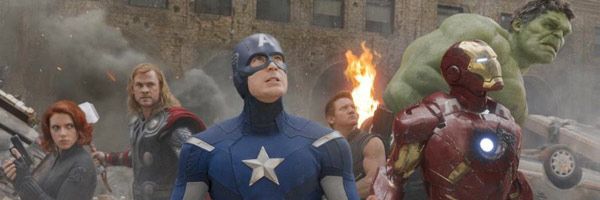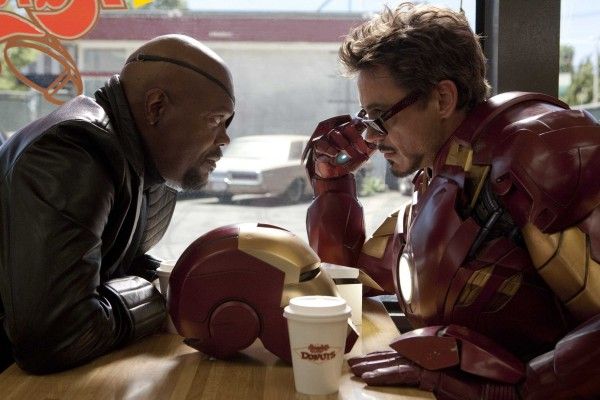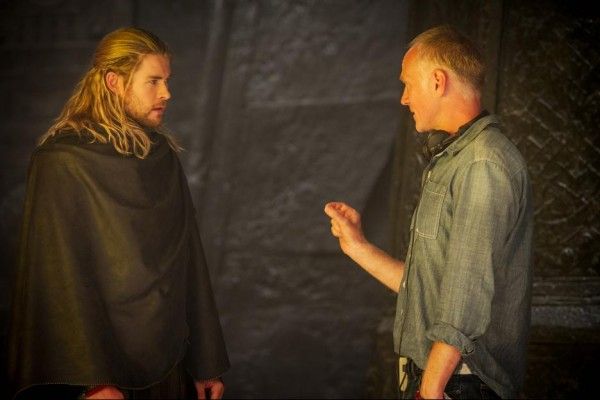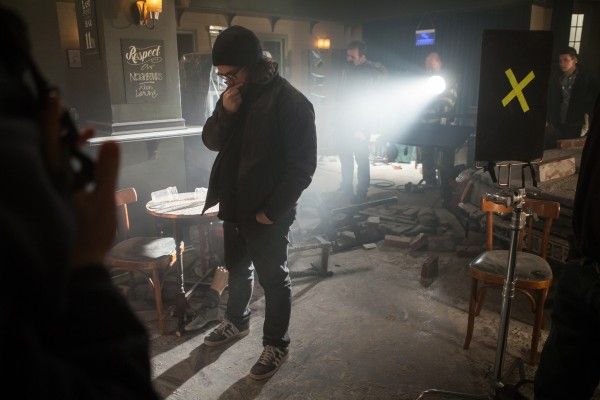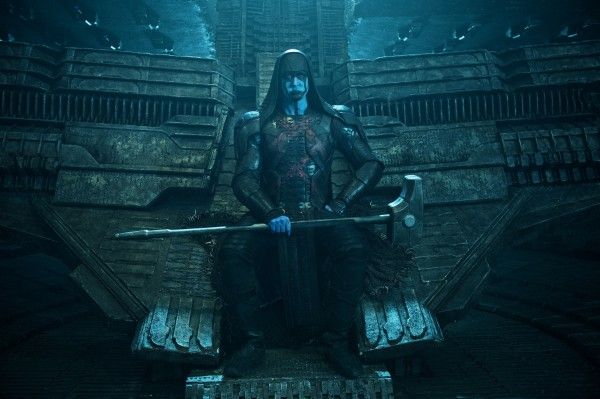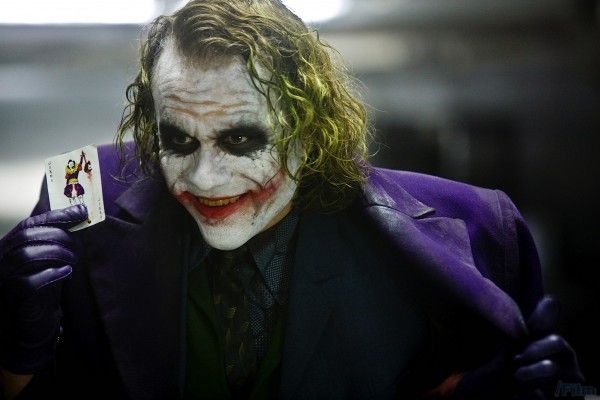When Marvel Studios started producing its own films with Iron Man in 2008, many in the industry and the public at large were quite sure that they would fail. Headlines famously accused the comic book company of delving into its “second-tier superheroes” in order to compete with the likes of Batman and Spider-Man at the box office, and few could have predicted just how successful the studio's new venture would be—or that Iron Man was only the beginning. The tag at the end of the Iron Man credits introducing Samuel L. Jackson’s Nick Fury kicked off one of the more ambitious feats in recent film history, beginning a series of interconnected movies that featured different lead characters inhabiting the same cinematic universe. This culminated in the 2012 team-up film The Avengers to the tune of $1.5 billion. Marvel Studios is now no longer just a production company; it’s a brand.
As with any successful brand, imitators followed. Other major studios are aiming to mimic Marvel’s success with their own interconnected universes, and just recently Warner Bros. announced release dates for nine untitled DC Comics adaptations that will surely all connect to one another. However, this new approach to franchise filmmaking—ostensibly treating movies as episodes in a TV series—may actually be robbing us of more creatively satisfying superhero adaptations.
While Iron Man was the beginning of the Marvel Cinematic Universe, the full scope of Marvel’s plans for its upcoming superhero adaptations really started to take shape in Iron Man 2, which is regarded by some as one of the studio’s bigger misfires. The film was of course the highly anticipated sequel to the surprise hit Iron Man, and while it pulled in a worldwide total of over $620 million, creatively the film was rather unsatisfying.
The principal culprit for the disappointment of Iron Man 2 was the film’s preoccupation with setting up the MCU as a whole, as the seeds for S.H.I.E.L.D. had to be planted, Scarlett Johansson’s Black Widow needed to be introduced, and a backstory involving Tony Stark’s father, Howard Stark, was meant to tease the past origins of some of the Marvel elements. Iron Man 2 had trouble standing on its own as a self-contained story due in large part to the fact that Marvel was more concerned with setting up future MCU films.
Though the studio found commercial success again with Thor, Captain America: The First Avenger, and of course The Avengers, these films also suffered from some of the same constraints that bogged down Iron Man 2 (who can forget the “cut & paste” approach to introducing Jeremy Renner’s Hawkeye in Thor?), and the issues continued in its Phase Two set of films. In effect, as Marvel became more comfortable with how it was building the Marvel Cinematic Universe, its films began looking more and more like TV episodes.
In the television landscape, the writer/showrunner is king. Since the showrunner is the one constant throughout a show’s run, the purpose of the director is to execute what’s on the page in a manner that’s in keeping with the agreed-upon aesthetic and tonal approach of the show. TV directors must ensure that one episode doesn’t look or feel too different from the others lest they risk breaking the illusion that the show’s characters exist in a single, cohesive, week-to-week TV universe.
This is not dissimilar to how Marvel approaches each of its feature films. In fact, directors like Alan Taylor and Joss Whedon have been forthcoming about the fact that they were handed very specific story beats, characters, and set pieces that had to be executed in their respective films. Marvel is, in effect, the “showrunner” of the Marvel Cinematic Universe, responsible for breaking the story (and possibly even acts) of each of their films before signing a director to execute said vision. This of course ensures that every Marvel movie has strong connective tissue with the films that precede and follow it, but it also puts creative constraints on the filmmakers.
It’s hard not to think of Edgar Wright and the upcoming Ant-Man when considering Marvel’s increasingly TV-like approach to its films. Wright signed on to write and direct an adaptation of the Ant-Man in 2006, which was around the time that Jon Favreau was preparing to shoot Iron Man, and thus predated the MCU. As the filmmaker returned to Marvel last fall in order to start prepping Ant-Man in earnest, creative differences began to arise between Wright and Marvel, which led to Wright departing Ant-Man earlier this year.
Looking back at the recent string of Phase Two Marvel films and their inherent sameness, the split between Wright and Marvel almost seems inevitable. More so than any other Marvel filmmaker thus far, Wright is an auteur. He has a very specific approach to his films—both visually and structurally—that would have felt out of place in the MCU. Edgar Wright’s Ant-Man would not have been Edgar Wright’s Ant-Man; it would have been Marvel’s Ant-Man, and bringing in a talent like Wright to essentially “blend in” by shooting an episode in a larger series would have been a waste of his talents.
This is why approaching movies like television is ultimately a bad idea. Yes, we get to see familiar characters inhabit each other’s films, but the tradeoff is that none of the films are really filmmaker-driven. Aesthetically, every Marvel movie feels the same. Yes, you can call The Winter Soldier a “political thriller”, but in the end it just feels like a Marvel movie. You can call Guardians of the Galaxy a “space opera”, but it too ultimately feels like a Marvel movie (right down to the now-signature climactic aerial battle). When filmmakers are only allowed to draw within very strict lines, it feels like we’re being denied some truly promising adaptations.
Moreover, when each film leads right into the next, stories doesn’t really end. Every Marvel movie concludes in the “To Be Continued” style of a two-parter on TV—except in this case it’s an “undetermined-number-parter” that could go on for decades. There’s a reason that Iron Man, Iron Man 3, and Guardians of the Galaxy are the Marvel movies that feel the most singular—they have the least to do with the rest of the MCU as a whole, and thus are freer to tell a (mostly) standalone story. One could argue that Guardians of the Galaxy has a lot of James Gunn in it, and while its true that the film’s excellent sense of humor and musical flourishes are in line with Gunn’s sensibilities, from a story and visual perspective the film is still very much in line with the “Marvel Movie” standard.
Now other studios are taking a cue from Marvel and developing their own interconnected universes. When Warner Bros. announced nine release dates for untitled DC Comics adaptations, it was clear that what they were really announcing was their own DC Cinematic Universe.
We’ve only seen one movie in this series of DC films thus far, Man of Steel, so it’s tough to know exactly how Warner Bros. will be approaching its own universe. Zack Snyder is directing the second film, Batman v Superman: Dawn of Justice, as well as Justice League, so there will be a rather established aesthetic for the DC Universe, but will filmmakers be allowed to express their own styles in other DC films? Will Wonder Woman and Aquaman have the same gritty yet bombastic aesthetic as Man of Steel and presumably Batman v Superman?
Moreover, will these films stand on their own as close-ended stories, or will WB be taking the Marvel approach and treating them as episodes? Since Warner Bros. seems to be a more director-friendly studio, I’m hoping that they’ll give their filmmakers more freedom when it comes to these DC adaptations, but if they’re really trying to ape what Marvel has done, we could see another TV-like approach to superhero adaptations. Warner Bros. could be the FX to Marvel’s ABC.
And given how successful Marvel has been thus far, who could blame them? Look, Marvel deserves respect for sticking with its ambitious plan, but it’s frustrating to see some of their properties being constrained by the inherent sameness that “the plan” requires. Look no further than Edgar Wright’s Ant-Man as evidence of what kinds of movies we’re being denied. If a filmmaker has a really great take on a Thor movie or a Captain America movie that doesn’t easily fit within the story and aesthetic constraints of the MCU, it cannot exist. Instead, what we get are episodes in a larger series that start to feel same-y due to the fact that they all have one showrunner: Marvel. Again, there’s a reason that “third act aerial battle” has become a frustrating staple of the MCU. When it’s Marvel Studios that is breaking out the story beats and set pieces instead of a filmmaker with a unique vision for his or her specific film, things start to get familiar.
Marvel isn’t likely to deviate from this plan in the near future, so now all eyes are on Warner Bros. and their DC Universe. Will we simply see the flip side of the coin—a series of interconnected superhero movies that are po-faced and dour? Or will the studio allow exciting directors to put their own spin on the material with a unique tone and aesthetic while maintaining loose connective tissue between films?
I understand that comics fans may be loving Marvel’s approach—it’s essentially executing the comics format on a massive scale—but I really think we may be losing some truly inventive and fresh adaptations as a result. Just think if Warner Bros. had told Christopher Nolan that he had to arc out a series of films when he started Batman Begins. With The Dark Knight, Nolan tells a singular, mostly close-ended story. He’s not introducing villains as Easter eggs to appear in future movies; he’s not keeping characters alive just so he can use them in other sequels; and he’s not trying to ensure that his film connects to whatever other DC characters might be used at a future date. As a result, we get one of the best superhero movies of all time.
Approaching films as television drowns out the singularity of each feature. We’re not only being denied unique, filmmaker-driven takes on properties, but we’re being robbed of complete stories. In this moviegoing climate dominated by reboots, sequels, and franchises, we’re inundated with movies that are either setting up a trilogy or an overall interconnected franchise. This denies us the satisfaction of a genuine ending for a lot of these films, which, you know, is kind of an important part of storytelling. With Marvel unlikely to waver, the onus is now on Warner Bros. to give us movies, not episodes.

